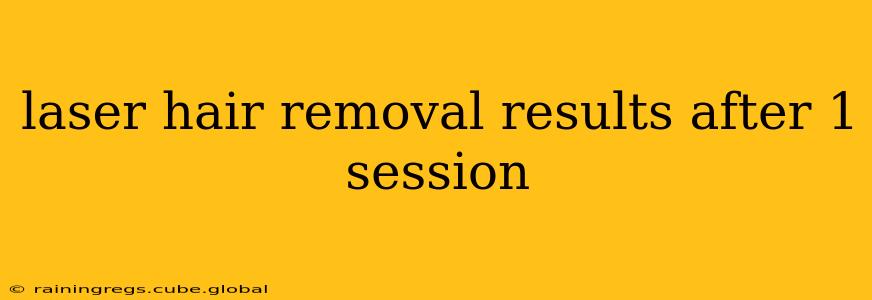Laser hair removal is a popular method for achieving long-term hair reduction, but understanding what to expect after just one session is crucial. Many people wonder if they'll see dramatic results immediately, and the answer is nuanced. While you won't likely achieve completely hairless skin after a single treatment, you can expect certain noticeable changes. This post will delve into the realistic expectations for laser hair removal results after your first session, addressing common questions and concerns.
What Happens During a Laser Hair Removal Session?
Before we discuss results, let's briefly understand the process. Laser hair removal uses intense pulsed light (IPL) or lasers to target the melanin (pigment) in hair follicles. The light energy converts to heat, destroying the follicle and preventing future hair growth. The effectiveness depends on several factors, including hair color, skin type, and the specific laser used.
Will I See Results After Just One Laser Hair Removal Session?
While you won't achieve complete hairlessness after one session, you will likely notice a reduction in hair growth. The extent of this reduction varies depending on individual factors. You can expect to see some hair fall out within a few days or weeks after the treatment, and new hair growth will be finer and sparser. Think of it as a significant thinning, rather than complete removal.
How Much Hair Reduction Can I Expect After My First Session?
The percentage of hair reduction after one session typically ranges from 10% to 25%, although this can vary significantly. Factors like hair color, skin tone, and the area being treated all play a role. For example, darker hair responds better to laser treatment than light or blonde hair.
What Does My Skin Look Like Immediately After the First Session?
Immediately after your first session, your skin might be slightly red and swollen. This is a normal reaction and usually subsides within a few hours. Some people experience mild discomfort or a burning sensation during the procedure, but this is generally well-tolerated. Avoid picking or scratching the treated area.
Will I Need Multiple Sessions for Optimal Results?
Yes, absolutely. Hair grows in cycles, and laser hair removal targets only hair in the active growth phase (anagen phase). Multiple sessions are necessary to treat hair follicles that are in different growth stages at the time of your initial treatment. Typically, a course of 6-8 sessions is needed for optimal results.
What Should I Avoid After My First Laser Hair Removal Session?
Avoid sun exposure, tanning beds, and harsh exfoliants on the treated area for at least a few days after your treatment to allow your skin to heal. This will minimize the risk of irritation and hyperpigmentation. Follow all aftercare instructions given by your laser technician.
Are There Any Side Effects to Laser Hair Removal?
While generally safe, laser hair removal can have side effects. These are usually minor and temporary, such as redness, swelling, and mild discomfort. Rarely, more serious side effects like blistering, scarring, or changes in skin pigmentation can occur. Choosing an experienced and reputable technician is crucial to minimize these risks.
How Can I Maximize the Results of My Laser Hair Removal Treatments?
Following your technician's instructions is paramount. Maintaining consistent appointments, avoiding sun exposure, and using recommended skincare products will all help maximize your results.
Conclusion
While the results after just one laser hair removal session might not be dramatic, they are still noticeable and encouraging. Think of it as a starting point on your journey to long-term hair reduction. Consistent treatments are key to achieving optimal results, and following proper aftercare will help you see the best possible outcomes. Remember to consult a dermatologist or a qualified laser technician for personalized advice and treatment planning.
